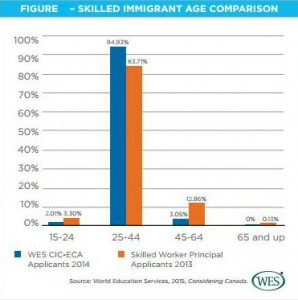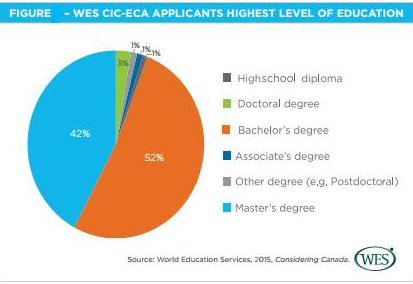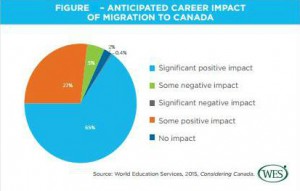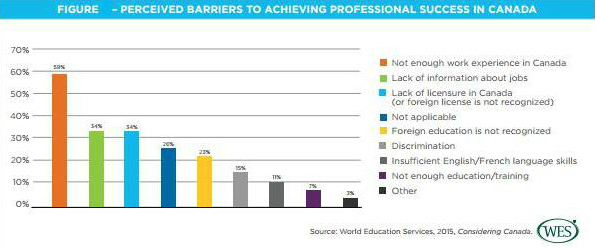‘Canada’s Immigration Landscape Is Changing’ — World Education Services
One of the largest recent surveys of the motivations, experiences, and service needs of prospective skilled immigrants to Canada has yielded some remarkable results. The survey of 3,181 respondents, which was carried out by World Education Services (WES), found that:
- 98 percent of respondents had a bachelor’s degree or higher
- 95 percent were 25–44 years of age
- Nearly half intended to settle in the province of Ontario
- Almost all want to immigrate to Canada for a “better standard of living”
- Indian and Filipino nationals account for an increasing number of skilled immigrants
World Education Services (WES) provides educational credential assessments (ECAs) as part of the application process for skilled immigrants. In 2013, Citizenship and Immigration Canada (CIC) created a new requirement that individuals applying to immigrate to Canada through the Federal Skilled Worker Program (FSWP) must submit an ECA for foreign credentials. With the launch of the Express Entry immigration selection system this year, candidates eligible for the FSWP must submit an ECA when they create a profile and enter the Express Entry pool.
The representativeness of the survey sample is consistent with the overall demographic characteristics and attributes of the FSWP client pool in WES’ database.
Nationality and country of residence
One-third of survey respondents were Indian nationals, with a further 16 percent being Filipino. Surprisingly, Chinese nationals made up only 6 percent of respondents, the same rate as citizens of Nigeria and Iran. As covered last month by CICnews, it was recently announced that the Philippines was the top source country for new immigrants to Canada in 2014.
It would appear, however, that overseas applicants for skilled immigration to Canada are a mobile group, with 6 percent residing in each of Canada and the United Arab Emirates, both of which have initiated extensive guest worker programs over recent years. Indeed, 10 percent of all survey respondents had resided in Canada at some stage, either as international students, foreign workers, or dependent family members.
Ontario remains the most popular Canadian immigration destination, with nearly half of respondents stating that they intend to settle in Canada’s most populated province. The rate of skilled worker settlement in Ontario among landed immigration applicants in 2013, however, showed that about one-in-three actually settled in Ontario.
Compared to the 1 percent of skilled workers who settled in Nova Scotia in 2013, 4 percent of applicants surveyed intended to settle in Nova Scotia. Indeed, Nova Scotia’s engagement with the federal Express Entry system via the Nova Scotia Nominee Program (NSNP) may prove to attract an even larger number of candidates in the future. Through its Nova Scotia Demand and Nova Scotia Experience immigration streams, both of which come under the NSNP, the Maritime province is the only province so far that has created more than one immigration stream aligned with Express Entry. In doing so, Nova Scotia may attract an increasing number of skilled applicants for Canadian immigration.
For other destinations, 22 percent selected Alberta as their intended settlement province, 12 percent selected British Columbia, while Manitoba, Quebec, and Saskatchewan attracted 2 percent each. Compared to immigrants in the economic category landing in 2013, 23 percent settled in Quebec, 15 percent in Alberta, 13 percent in British Columbia, 6 percent in Manitoba, and only 1 percent in each of Nova Scotia and New Brunswick. The survey was only issued to applicants for the FSWP, and CIC states that applicants to that program should not have the intention to settle in Quebec.
With level of education being an important factor under the FSWP, it is no surprise that most survey respondents were highly educated. The rate of higher education, however, was extraordinary, with 98 percent holding a bachelor’s degree, master’s degree, doctoral degree, or postdoctoral fellowship. A full 42 percent of all respondents had a master’s degree, with 52 percent having a bachelor’s degree as their highest level of education.
By comparison, CIC’s 2012 data on Canadian immigration applicants under skilled categories show that 34 percent had a bachelor’s degree and 18 percent had a master’s , revealing that applicants for an ECA have more degree-level qualifications than past skilled worker principal applicants.
The survey found that engineering was the most popular field of study, with 40 percent of respondents having studied some area of engineering. This was followed by business and management (22 percent), health (17 percent), and math and computer science (13 percent).
Work experience
In order to be eligible for the FSWP, candidates must have at least one year of full-time skilled work experience within the last 10 years. The more skilled work experience a candidate has, the more points he or she will be awarded under both the FSWP eligibility points grid and the Express Entry Comprehensive Ranking System. Ninety-three percent of respondents indicated that they had at least three years of relevant skilled work experience.
More than 60 professional categories were represented, though none dominated the survey responses. Top professional categories included registered nurses and registered psychiatric nurses, software engineers and designers, computer programmers, interactive media developers, information systems analysts, consultants, financial and investment analysts, and civil engineers. Each of these occupation categories was represented by between 5 and 7 percent of respondents. The current FSWP does not have a defined list of eligible occupations, as the previous version of the program did.
Survey respondents were largely motivated to immigrate to Canada for a “better standard of living.” Indeed, when asked to identify the three largest migration motivators to come to Canada, 89 percent of respondents noted that a better standard of living (including safety and comfort) was important, followed by 70 percent who cited a better career and job prospects, and 49 percent who said they felt that there would be better educational opportunities for themselves and their families.
Other migration motivators included more political stability and freedom (31 percent), better salary (23 percent), and factors related to family reunification, immigration policies in Canada, opportunities for children, and Canadian culture (13 percent).
A full nine out of every ten respondents were highly optimistic about their career prospects in Canada and overall settlement success. Nearly 60 percent indicated that they expected to find a job in their field within a year of arriving in Canada, which has, in reality, proved difficult for many newcomers. With the Comprehensive Ranking System awarding 600 points (out of 1,200 in total) to candidates with a qualifying job offer of arranged employment, a greater number of current and future applicants for Canadian immigration through the FSWP may feel confident about their job and career prospects in Canada.
Respondents were also asked to indicate what they perceive as the barriers to professional success in Canada, with a majority identifying their “lack of work experience in Canada” as a significant barrier. Other perceived barriers and challenges to career success in Canada included lack of information about jobs and the perceived difficulty of the licensing process in Canada, both of which were cited by about a third of all respondents.
The reaction
“Up-to-date empirical research such as this is rather sparse when it comes to Canadian economic immigration, so it’s great to see some thorough research and results. The large sample size of the survey and the types of questions asked mean that we can take much from this report,” says Attorney David Cohen.
“In particular, we are seeing a more mobile, middle-class base of skilled candidates for immigration to Canada. Indeed, 50 percent of respondents self-identified as middle class, with a further 35 percent saying they were upper-middle class. Taken with the data on education levels and work experience, it appears that an increasing number of ambitious, skilled professionals are recognising that Canada is a wonderful place to build a career and grow a family.
"The perceived barriers to professional settlement can be mitigated by candidates who prepare well in advance and locate experts in Canada who are in a position to help. As a start, I would encourage any potential candidate for Canadian immigration to use the Job Search tool and try to get regular, up-to-date access to open job positions in their field across Canada.”
To find out if you are eligible for the current Federal Skilled Worker Program, or any of over 60 Canadian immigration programs, please fill out a free online assessment today.
©2015 CICnews All Rights Reserved
- Do you need Canadian immigration assistance? Contact the Contact Cohen Immigration Law firm by completing our form
- Send us your feedback or your non-legal assistance questions by emailing us at media@canadavisa.com







